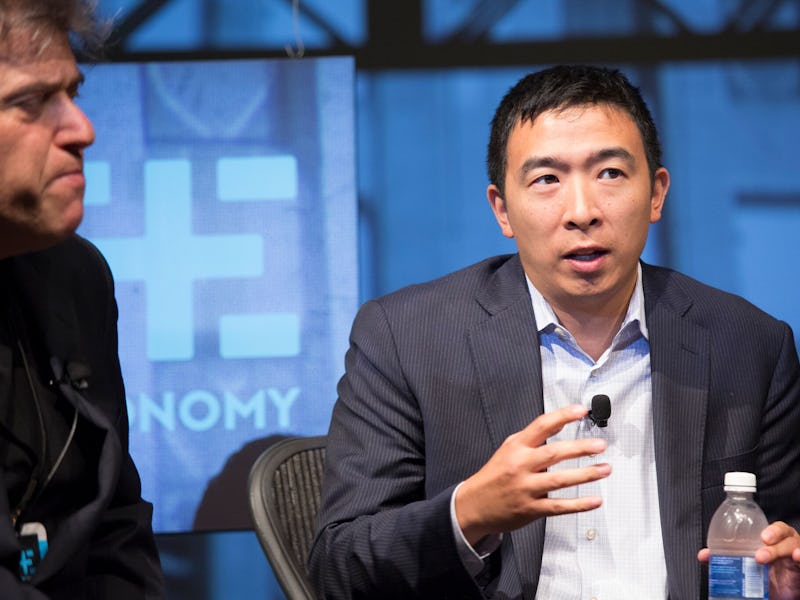Andrew Yang Talks UBI, Deep Fakes in Tech Savvy Presidential Town Hall
Andrew Yang is not a single issue candidate.

Presidential hopeful Andrew Yang capitalized on the surprising early momentum of his long-shot presidential bid on Sunday evening during a highly tech-savvy CNN Town Hall. In addition to reiterating his oft-repeated case for establishing a universal basic income through his proposed “Freedom Dividend,” Yang also touted policies for stemming the opioid crisis and cracking down on the growing problem of deep fakes.
Interest in Yang has surged during the early days of the Democratic primary. A national poll released Monday by Emerson had Yang polling at 3 percent of the vote nationwide, up from just 1 percent from a poll taken March 17 and March 18. A poll is just a poll, but according to Emerson’s reading Yang now trails only six candidates, two of whom have run for president before and have a massive advantage in terms of name recognition.
In terms of the betting odds, Yang performs even better than Massachusetts Sen. Elizabeth Warren, who is already widely perceived as the race’s policy powerhouse.
In the CNN Town Hall, Yang tried to walk a careful line between showing voters that he is not a single-issue candidate while still arguing that confronting the threats posed by automation and A.I. are the singular challenges of our time. The Freedom Dividend came up often despite a wide range questions covering everything from military intervention to prescription drug costs and Medicare for All.
“You don’t think about 40 percent of malls closing as an automation or A.I. problem,” Yang said “But when you trace the steps … go to an Amazon Fulfillment center, and you’ll see it’s wall-to-wall robots and they’re investing billions in A.I. It’s very hard to stop this process. The goal should not be to save jobs, it should make our lives better.”
Yang’s Freedom Dividend also featured prominently in a number of his responses to specific voter concerns (in CNN’s Town Hall format, questions are both culled from audience members and provided by the moderator, in this case CNN anchor Dana Bash). In response to a question about the decline of organized labor, Yang noted that his dividend would make it “much easier for them to negotiate much harder.” The Freedom Dividend also came up in responses to a questions about teacher pay and housing affordability.
“I would suggest that putting $1,000 a month into Americans’ hands a month in portable income would make it so that people are much better able to find housing that works for them,” Yang said. “75 percent of kids’ academic performance is determined by non-academic factors … If we are serious about educating our children, we need to get money into the hands of the parents and families.”
The most heated exchange came when Yang addressed one of his more controversial policies, the creation of a so-called “News Ombudsman” to create consequences for news organizations that circulate fake news or other misinformation. Yang argued that policy makers are not taking the problems of misinformation enabled by better deep fakes seriously, and that the consequences for circulating this information are insufficient.
“We’re on the verge of a very difficult time, Americans can’t trust what we see, and this is before deep fakes really hit the internet,” Yang warned. “News ombudsmen would punish those who misinform the public.”
Unsurprisingly, as a member of the media, Bash pushed back on this policy in particular, pressing Yang on how this wouldn’t amount to the government trying to police speech.
“The vast majority of news organizations would have nothing to worry about,” Yang explained. “It’s not like CNN is spreading mis-information willfully … they would have no issue with this.”
Yang’s team was quick to capitalize on the event, building a new fundraising push and releasing some new merch pegged to one of Yang’s one-liners — that the president’s “opposite” was an Asian American man who “likes math” — within 24 hours of the Town Hall’s conclusion.